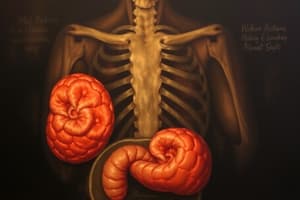Podcast
Questions and Answers
What is the most common type of malignant gastric tumor?
What is the most common type of malignant gastric tumor?
- Gastrointestinal Stromal Tumors
- Gastric Adenocarcinoma (correct)
- Lymphoma
- Neuroendocrine Tumors
Which factor is strongly linked to the risk of developing gastric adenocarcinoma?
Which factor is strongly linked to the risk of developing gastric adenocarcinoma?
- Helicobacter pylori infection (correct)
- Genetic predisposition
- Age under 30
- High fruit intake
What is a common symptom experienced in the early stages of gastric tumors?
What is a common symptom experienced in the early stages of gastric tumors?
- Severe abdominal pain
- Weight gain
- Fever and chills
- Changes in appetite (correct)
What type of tumor originates from the glandular epithelium in the stomach?
What type of tumor originates from the glandular epithelium in the stomach?
What diagnostic procedure allows for direct visualization of the stomach?
What diagnostic procedure allows for direct visualization of the stomach?
Which of these factors does NOT increase the risk of gastric tumors?
Which of these factors does NOT increase the risk of gastric tumors?
Which treatment option might be used for specific genetic mutations in gastric tumors?
Which treatment option might be used for specific genetic mutations in gastric tumors?
What symptom might indicate gastrointestinal bleeding in gastric tumor patients?
What symptom might indicate gastrointestinal bleeding in gastric tumor patients?
Flashcards are hidden until you start studying
Study Notes
Definition
- Gastric tumors are abnormal growths in the stomach, which can be benign or malignant.
Types of Gastric Tumors
-
Benign Tumors
- Adenomas: Arise from the glandular epithelium; usually asymptomatic.
- Gastrointestinal Stromal Tumors (GISTs): Mesenchymal tumors; may be benign or malignant.
- Lipomas: Fat tissue tumors; rare.
-
Malignant Tumors
- Gastric Adenocarcinoma: Most common type; originates from the gastric epithelium.
- Lymphoma: Can arise from the stomach; associated with Helicobacter pylori infection.
- Neuroendocrine Tumors: Rare; can produce hormones affecting gastric function.
Risk Factors
- Helicobacter pylori infection: Strongly linked to gastric adenocarcinoma.
- Chronic gastritis: Inflammation may lead to dysplasia and cancer.
- Diet: High salt, smoked foods, and low fruit/vegetable intake increase risk.
- Family history: Genetic predisposition can play a role.
- Age: Increased risk in individuals over 50.
Symptoms
- Early stages often asymptomatic.
- Common symptoms include:
- Abdominal pain or discomfort.
- Nausea and vomiting.
- Weight loss.
- Changes in appetite.
- Gastrointestinal bleeding (melena, hematemesis).
Diagnosis
- Endoscopy: Direct visualization of the stomach; allows for biopsy.
- Imaging: CT scans and MRI for staging and assessing metastasis.
- Biopsy: Critical for definitive diagnosis; histological examination.
Treatment
-
Benign Tumors
- Monitoring for small lesions.
- Surgical resection for larger or symptomatic tumors.
-
Malignant Tumors
- Surgery: Partial or total gastrectomy depending on tumor size and location.
- Chemotherapy: May be used pre-operatively (neoadjuvant) or post-operatively (adjuvant).
- Radiation Therapy: Less common; used in specific cases.
- Targeted Therapy: For specific genetic mutations (e.g., HER2-positive tumors).
Prognosis
- Varies based on tumor type, stage at diagnosis, and treatment response.
- Early detection significantly improves survival rates.
- Regular follow-up is essential for monitoring recurrence.
Definition
- Gastric tumors are abnormal growths in the stomach that can be benign or malignant.
Types of Gastric Tumors
-
Benign Tumors
- Adenomas: Derived from glandular epithelium, typically asymptomatic.
- Gastrointestinal Stromal Tumors (GISTs): Mesenchymal tumors; can be either benign or malignant.
- Lipomas: Tumors of fat tissue, which are rare.
-
Malignant Tumors
- Gastric Adenocarcinoma: The most prevalent type, originating from the gastric epithelium.
- Lymphoma: May develop in the stomach, linked to Helicobacter pylori infection.
- Neuroendocrine Tumors: Rare tumors that secrete hormones impacting gastric function.
Risk Factors
- Helicobacter pylori infection: Strong association with gastric adenocarcinoma development.
- Chronic gastritis: Ongoing inflammation can lead to dysplasia and potential cancer.
- Diet: High consumption of salt, smoked foods, and low intake of fruits/vegetables can elevate risk.
- Family history: Genetics can influence susceptibility to gastric tumors.
- Age: Risk increases significantly for individuals over the age of 50.
Symptoms
- Early stages frequently present without symptoms.
- Common manifestations include:
- Abdominal pain or discomfort.
- Nausea and vomiting.
- Unintentional weight loss.
- Changes in appetite.
- Gastrointestinal bleeding, indicated by melena or hematemesis.
Diagnosis
- Endoscopy: Allows for direct visualization of the stomach and facilitates biopsies.
- Imaging: CT scans and MRIs are used for staging tumors and assessing metastasis.
- Biopsy: Essential for a definitive diagnosis through histological analysis.
Treatment
-
Benign Tumors
- Small lesions are often monitored for changes.
- Surgical removal is recommended for larger or symptomatic tumors.
-
Malignant Tumors
- Surgery: Options include partial or total gastrectomy, based on tumor size and position.
- Chemotherapy: Utilized as neoadjuvant (before surgery) or adjuvant (after surgery) treatment.
- Radiation Therapy: Less commonly used, reserved for specific cases.
- Targeted Therapy: Focuses on tumors with specific genetic mutations, such as HER2-positive.
Prognosis
- Prognosis is influenced by tumor type, stage at diagnosis, and response to treatment.
- Early detection is critical for improving survival rates.
- Regular follow-up is important for monitoring potential recurrence of tumors.
Studying That Suits You
Use AI to generate personalized quizzes and flashcards to suit your learning preferences.



